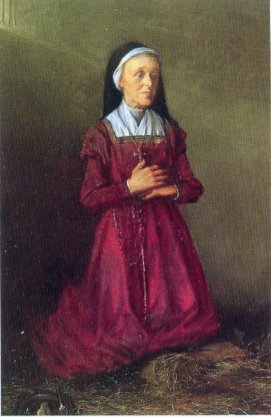
Blessed Margaret Ball, one of the Irish martyrs whose feast we remember today
Sunday and Monday last were days of wonderful grace for me, as if the Hunter of souls had run His quarry down and so surrounded it with the coils of His love that all escape was impossible. Alas! Does he not well know how that foolish hare will break loose and escape again so soon, spoiling all the plans of the patient Hunter. Still Jesus cannot pass close to the soul without leaving some lasting impression. I cannot but feel that the light he has given me must leave its mark behind, and that I cannot be quite the same again without an awful abuse of grace.
COMMENT: Fr Doyle wrote these words in his diary 104 years ago today, on June 20 1912.
Fr Doyle often spoke about the notion of abusing God’s grace. It is not something we hear much about today. In essence, he means that we shall have to give an account of all that God has given us. Everything we have is a gift of God. But God is entitled to a return on that gift; He expects us in some way to use the talents and graces that He has given us to good effect – to give glory to Him and to save souls. Yet, how often do we fail to wisely “invest” those talents that he has given to us…
One of the most frightening lines in the Gospel is found in Chapter 11 of St Matthew’s Gospel. It is easy to overlook it and its significance for us. Speaking of the town of Capernaum, Jesus says:
If the mighty works done in you had been done in Sodom, it would have remained until this day. But I tell you, it shall be more tolerable on the day of judgement for Sodom than for you.
In other words, those who never received the grace of faith, even though their sins are greater, will receive a lesser punishment than those who have had the faith revealed to them, but whose sins are smaller. These are stunning words that all who consider themselves to be “practising Catholics” need to carefully reflect on. We abuse the graces of God to our peril!
One of the great gifts that God has given us is the gift of faith. Here in Ireland, until very recently, the Catholic Faith was held in high esteem. Yet, largely due to internal corruption, many have now abandoned Christ and His Church, often without ever knowing much about it at all.
Today in Ireland we celebrate the feast of the Irish martyrs – 17 men and women who lost their lives because of their faith in the late 1500′s and early 1600′s and who were beatified by Saint Pope John Paul II in 1992. Whatever crisis of aggressive secularism we now face in Ireland, we are at least not losing our lives for our faith. Yes, we may be belittled, we may have our sanity or our decency questioned. We may even lose out financially or in our careers due to a subtle discrimination against those of faith. In a sense, this is also a persecution, but a bloodless, psychological one. The Irish martyrs remind us of what our ancestors suffered to preserve the faith in Ireland. From this small land, many missionaries went out to evangelise the new world, especially in Africa, America and Australia. These 17, plus the hundreds of other unrecognised martyrs, and the other unknown multitudes who suffered in other ways, have played a significant role in the evangelisation of the English speaking world by preserving the faith for future generations. How well are we doing in preserving the faith for future generations? Have we abused this gift that God has given to us?
During the homily for the beatification of these martyrs, St John Paul said:
We admire them for their personal courage. We thank them for the example of their fidelity in difficult circumstances, a fidelity which is more than an example: it is a heritage of the Irish people and a responsibility to be lived up to in every age.
Today is a day on which Irish people could well reflect on whether we have fully lived up to the responsibility of following the fidelity of these martyrs.
Today is a day of remembering these heroic men and women, and being thankful for their sacrifice. It is also a day on which those of us in Ireland might well examine our consciences, myself included. What is to happen with these 17 Irish martyrs? Is there any interest in having them canonised? Is there any attempt to promote devotion to them and learn from their examples? Do we pray through their intercession for miracles? Are we happy that they, and the hundreds of others who could be beatified, are largely forgotten?
Below is an interesting audio presentation on the life of Blessed Dermot O’Hurley, the martyred Archbishop of Cashel and one of the 17 martyrs.
